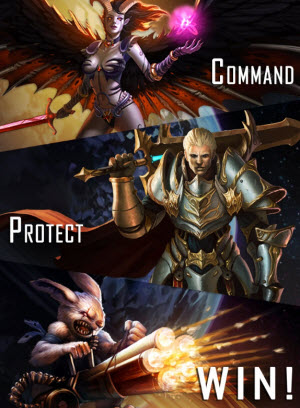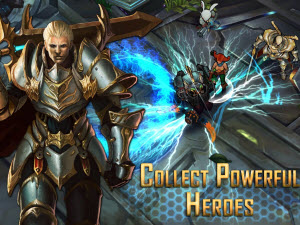GamesBeat: There was a market analysis firm, the Corum Group, that said there are 30 companies in Asia that have at least $1 billion in cash and have already made game acquisitions. They suggested that was going to drive the trends in game acquisition for quite a while. It seems clear that Asia is going to become a lot more important games than it historically has been. Do you have any observations about that? There were times in the industry where there was a sort of geographic arbitrage that people could do. The French game companies, a long time ago, had a very high valuation. They were able to buy things like Atari and other companies that weren’t valued well. It’s an interesting phenomenon right now.
Xiao: Again, the business world is going up and down, up and down. It’s a cycle. In certain regions, valuations will be high at one point and lower at another. But I think the key, if you look at the fundamentals of all of this—You look at the major market these players are serving. If you anticipate that major market will be there, even if there are those ups and downs, the baseline will be trending up. Then the question comes back to, look at the world. Where are the emerging markets?
Major markets would be the countries or regions with the biggest populations and increasing disposable income – the U.S., Japan. There are hundreds of millions of people there. China is coming up. It’s emerging, but it’s relatively mature in many senses. Maybe India, maybe Indonesia. I recently visited Indonesia. There are hundreds of millions of people there. Once their disposable income reaches a certain level, the market will grow.
Asian companies will be a major force in the game industry for a long time to come. As far as mergers and acquisitions, it always happens. But it won’t happen in a designed way. You’ll see some companies operating well and some companies that make mistakes. If you make a big mistake, there’s the potential of being acquired. My anticipation is that, no matter what, in any given market you’ll have several big players coexisting at any given time. You might have more, but you can’t have just one or two. We could be one of those players – not only in Asia, but also globally.
We’re buying in China and the U.S., by the way. We’re shopping around the world.
GamesBeat: One interesting trend is that, with mobile messaging networks like Kakao in Korea–You could publish games on Facebook and make them go worldwide. But you might make more money just putting one game into Kakao. I wonder which way the world is going to build in that sense.
Xiao: To give you a simple answer, they’ll coexist. The populations they’re serving will be different. Or they’ll serve different needs for the same people. People sitting in front of the TV, in front of a PC, in front of a mobile device, they all have different needs. Different platforms and ways of entertainment will coexist.
My strategy is very simple. You have to look at different screens. Even the same person will be exposed to different screens, and depending on the screen they’ll have different needs. Or they may have similar entertainment needs that are segmented, that utilize different products. Also, it’s not only on the screen. TV or movies or literature or some other kind of experience might all come through the same IP or the same storyline. A book can lead to a console game and then a TV series or a movie or whatever. Content-wise, there’s always another axis to satisfy people’s different needs as well.
All this will coexist. We can’t just say, “Okay, TV’s come in, so there will be no more movies.” Just because Kakao is here, that doesn’t mean Facebook will go away. Facebook is a different way of life, and people will still use it. I don’t anticipate that consoles will go away for a long time. You can’t replicate that experience on PC or mobile. There might be a smaller number of people enjoying it, but it’s still going to be there.
GamesBeat: When you think about getting the Perfect World brand established, have you thought that maybe the quickest, but most difficult way to do that would be to make console games?
Xiao: I wouldn’t say building a console game is a quick solution. [laughs] But certainly it could be more effective. We’ll definitely think about it. Something like that requires an opportunity, a turning point where you can get in. We’re looking for that opportunity, either by acquisition or some other way. We’re looking into console game studios, to see if there are any good opportunities to invest. As I say, we believe that form of gameplay will always be there. Even if it’s very mature, if you see a good team and invest, they can build good games. It’s definitely a possibility.
GamesBeat: With Nexon, they seem to be picking very well-known game leaders for their new studios and investing in them, but for the mobile market.
Xiao: Mobile is definitely the key. It’s the future. You could say that console is the past, but it will still be there for a long time. That’s why I talk about a portfolio. You don’t just limit yourself to high risk, high return. You invest money in several formats. You maintain a balanced approach.
Back to your earlier question, building a brand is something you do over the long run. The goal is to build something sustainable. We don’t just want to take a big risk for a big return in two years. We’ve already IPO’d. We have a bunch of shareholders and customers to serve. What we want to do is gradually build the brand, and for that you have to be a sustainable business in a growth direction. Every strategy and every action we’ve taken, including building this portfolio and investing in the future and cross-platform handling of our resources, all this serves the purpose of creating sustainable growth in the years to come.
VentureBeat's mission is to be a digital town square for technical decision-makers to gain knowledge about transformative enterprise technology and transact. Learn More



